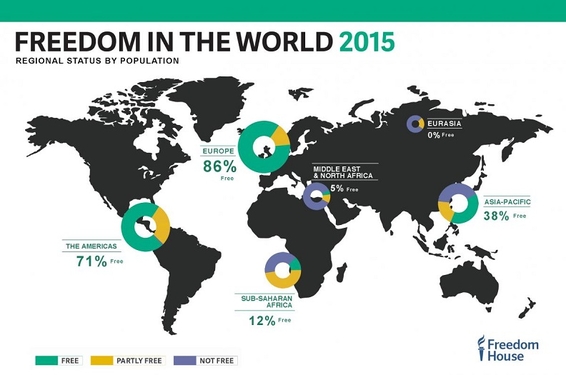 For the 10th year in a row, the influential human-rights organization Freedom House reports a decline in freedom worldwide.
For the 10th year in a row, the influential human-rights organization Freedom House reports a decline in freedom worldwide.
Freedom House, the esteemed human rights and democracy organization, is out with the latest edition of its flagship publication, "Freedom in the World," an annual survey of political rights and civil liberties in every country on earth. The news is dispiriting. For the 10th year in a row global freedom declined, with 72 countries becoming less free, while 43 made gains. Of the world's 7.3 billion people, only 40 percent live in countries rated "Free," down from 46 percent a decade ago. Another 24 percent live in nations designated as "Partly Free," while the remaining 36 percent — more than one-third of the human race — suffers under the repressive regimes that rule countries deemed "Not Free."
On the whole, liberal democracies flourish in Europe and the Americas; the greatest concentration of tyrannies is in the Middle East and Africa. There are notable exceptions, of course: In the otherwise despotic Arab world, Tunisia is valiantly transforming itself into an outpost of freedom, and has joined Israel in the region's minuscule club of democracies. Conversely, while most countries in the Western Hemisphere are free, Cuba is still a totalitarian dictatorship, and some Latin American nations — including Mexico, Colombia, Venezuela, and Ecuador — are only Partly Free.
"The world was battered in 2015 by overlapping crises that fueled xenophobic sentiment in democratic countries . . . and led authoritarian regimes to crack down harder on dissent," the Freedom House authors write. The decade-long drift away from freedom was perhaps most evident in nations like China, Russia, and Iran, where harsh regimes grew even harsher, strangling dissent and intensifying censorship. But the report documents the drifting-from-freedom trend in country after country, including some that pride themselves on their respect for civil liberties and human rights.
Especially disturbing was the democratic world's paralysis in the face of Syria's savage civil war, and the refugee flood it unleashed.
Because the United States and Europe failed to support the moderate Syrian rebels in the war's early stages, the West now faces "the most complex challenge to peace and stability in years," Freedom House laments. "The leaders of the free world have fallen short even as fundamental democratic principles come under threat in their own countries." Hostility to asylum seekers, growing support for illiberal parties and candidates, and the angry tone of populist rhetoric are signs of that downward trend.
None of this means that democracy and liberty are on the ropes worldwide, or that tyranny is now in the saddle and rides mankind. Even by Freedom House's reckoning, the world is still considerably freer than it was at the end of the Cold War. Amid the eruptions of evil that dominate the daily headlines, there are good reasons to be optimistic about the underlying state of the world.
All the same, a 10-year slide in political and civil liberties is disquieting, particularly to Americans.
The spread of liberty across the globe has traditionally been an essential American value; no nation has ever felt so keenly the call to make men free. Like just about everything else these days, America's role on the international stage is a polarizing political topic. Some candidates for high office insist passionately that the planet is a safer and a better place when the United States is the strongest power in the world; others argue with equal vehemence that US leadership abroad matters less than nation-building here at home.
American interventions overseas, from Korea to Kuwait to Kosovo, invariably generate heated partisan debate. For that matter, so do noninterventions. President Eisenhower was sharply criticized for doing nothing as Soviet tanks crushed the Hungarian uprising of 1956; President Obama was sharply criticized for doing nothing as Tehran's thugs smashed the peaceful Iranian democracy protests of 2009.
But if the noisy political brawls are a given, so too is the underlying conviction that for Americans, freedom in the world can never be merely an aspiration. It is, in some sense, America's mission — a mission that has never belonged to only one party.
Harry Truman vowed not to abandon "the free peoples of the world," and promised that "what we have achieved in liberty, we will surpass in greater liberty." Six decades later George W. Bush reaffirmed that it was America's policy "to seek and support the growth of democratic movements and institutions in every nation," and offered encouragement to those who live under repression: "When you stand for your liberty, we will stand with you." One was a Democrat, the other a Republican, but both were voicing an authentically American ideal.
In the most eloquent inaugural address of the 20th century, John F. Kennedy famously pledged that the United States would "pay any price, bear any burden, meet any hardship . . . to assure the survival and the success of liberty."
Where else do heads of state speak this way as they assume the reins of power?
The belief that freedom is an inalienable human right is perhaps the most deeply-rooted tenet in the American creed, however imperfectly we may uphold that creed.
When Freedom House was born in 1941, two of its founders were Wendell Willkie, the Republican candidate for president the year before, and First Lady Eleanor Roosevelt, whose husband had won that election in a landslide. The impulse to "let freedom ring" crosses party lines in this country. So does the feeling that something isn't quite right in the United States if liberty and democracy are losing ground elsewhere. For what happens to freedom in the world always happens on America's watch.
Comment by clicking here.



 Contact The Editor
Contact The Editor
 Articles By This Author
Articles By This Author